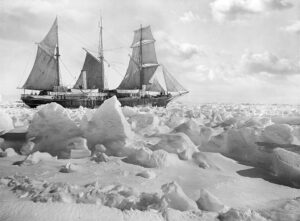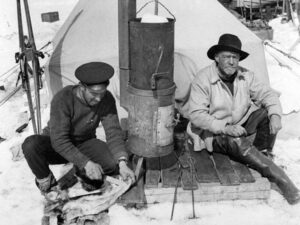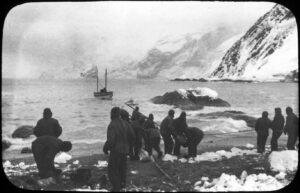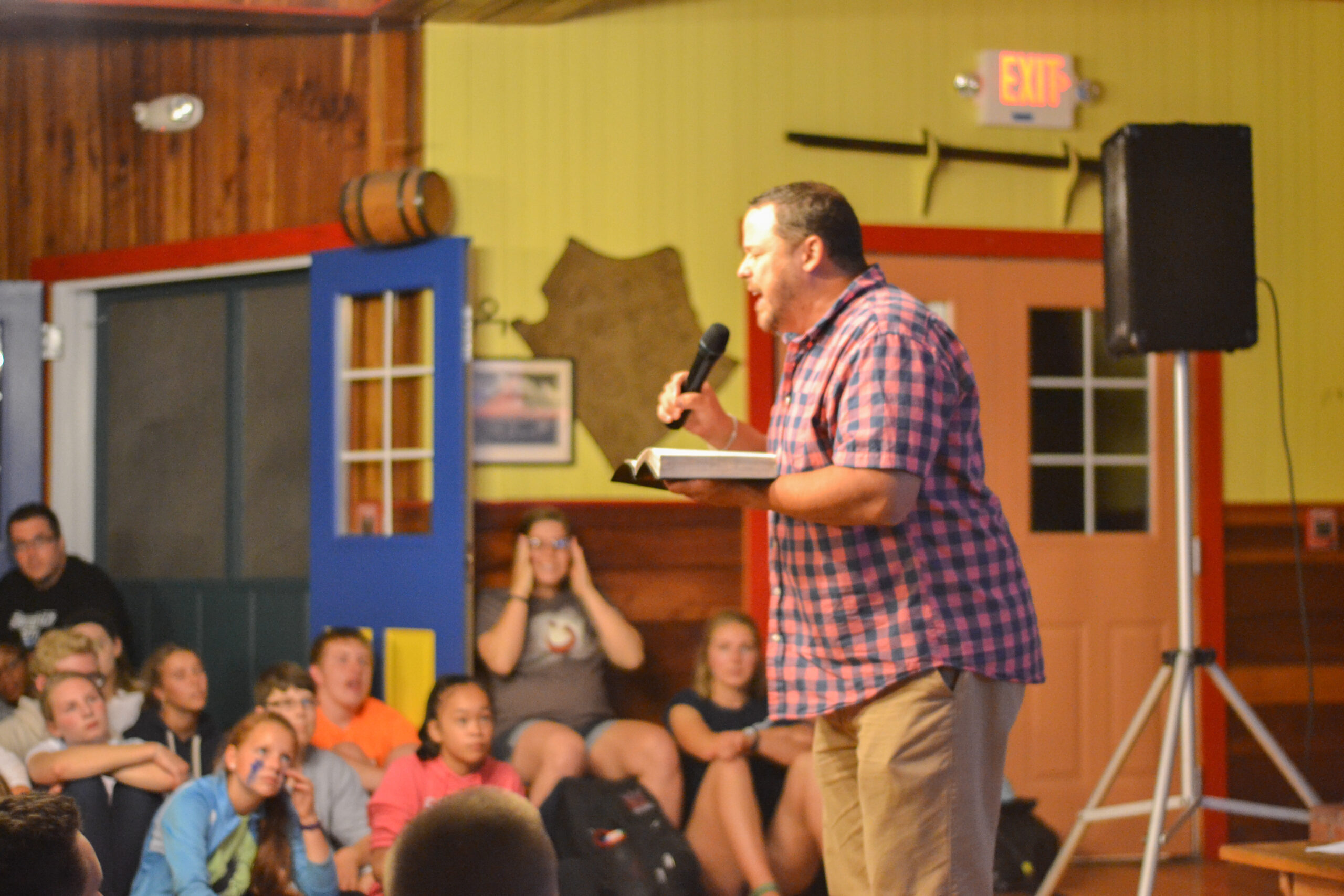 In 1914, Sir Ernest Shackleton and 27 crewmembers sailed from Plymouth, England, on a ship named The Endurance. On January 18, 1915, after five months at sea, the ship became stuck in polar pack ice. The crew waited patiently for the ice to shift and release the boat, but after many days they realized that the ice would not be moving again until the seasonal thaw which was nine months away. Week after week, the crew lived in their stuck ship, until finally the tremendous pressure from the moving ice began to crush the hull. The crew salvaged what they could and set up shelters on the ice, calling their makeshift settlement Camp Patience. For days the men watched as the large boat slowly disappeared into the frozen sea.
In 1914, Sir Ernest Shackleton and 27 crewmembers sailed from Plymouth, England, on a ship named The Endurance. On January 18, 1915, after five months at sea, the ship became stuck in polar pack ice. The crew waited patiently for the ice to shift and release the boat, but after many days they realized that the ice would not be moving again until the seasonal thaw which was nine months away. Week after week, the crew lived in their stuck ship, until finally the tremendous pressure from the moving ice began to crush the hull. The crew salvaged what they could and set up shelters on the ice, calling their makeshift settlement Camp Patience. For days the men watched as the large boat slowly disappeared into the frozen sea.
The ice floe continued to move north and in early April, nearly four months after the pack ice had stopped the expedition, Shackleton decided that their only chance for survival was to use the salvaged life boats to find help. After seven terrible days on the open sea the men arrived on an uninhabited spit of rock named Elephant Island. Shackleton knew the chances of a rescue from this remote island were nonexistent so he made the difficult decision to break up his crew. He selected five of the strongest sailors in the crew and announced that they would sail one of the lifeboats to South Georgia Island where they could get help at a whaling station. South Georgia Island was over 800 miles away.
 For those who remained behind, Elephant Island was a desolate place. The crew was frostbitten and in poor health; some were on the verge of mental breakdown. The men overturned the remaining lifeboats and built crude shelters using the rocks around them. The remnants of their tents were used for insulation against the wind, which at times reached upwards of 100 mph. Blubber burning lamps were the only source of light in their dim shelters as they dealt with nighttime temperatures as cold as 20 below. Hunting expeditions were organized to keep the crew occupied during the day and in the evening the men would gather together and sing songs to cope with their anxiety as they waited for their leader to return.
For those who remained behind, Elephant Island was a desolate place. The crew was frostbitten and in poor health; some were on the verge of mental breakdown. The men overturned the remaining lifeboats and built crude shelters using the rocks around them. The remnants of their tents were used for insulation against the wind, which at times reached upwards of 100 mph. Blubber burning lamps were the only source of light in their dim shelters as they dealt with nighttime temperatures as cold as 20 below. Hunting expeditions were organized to keep the crew occupied during the day and in the evening the men would gather together and sing songs to cope with their anxiety as they waited for their leader to return.
Two weeks after leaving his men behind, Shackleton’s boat reached South Georgia Island. Over the next three months Shackleton made numerous attempts to reach Elephant Island, but the thick ice in the sea surrounding the island made a rescue impossible. Shackleton grew more and more concerned for the welfare of the men he had left behind. After several more unsuccessful attempts, the weather finally permitted him to sail to his men.
On August 30, 1916, – 19 months after their ship had become stuck in the ice, and four months after their leader had left for help – Shackleton arrived at Elephant Island. When he finally reached his men, he was overjoyed to find them all alive, and amazed to find them all packed up and waiting for his arrival. His crew quickly scrambled aboard the rescue ship and no sooner had the ship cleared the island, then the ice smashed together behind them.
In the days following the incredible rescue, Shackleton asked his men how they knew to be ready on the day of his arrival. One of the crew members replied, “Sir, when you left, you said you would come back for us, so we never gave up hope. Each day, we packed up our sleeping bags and reminded each other, ‘Watch friends! The boss may be coming back today.’ We were always ready for your return.”
One of the reasons the “Shackleton” story is so amazing is because what we see from the men on Elephant Island is so different from what we see in ourselves. We are impatient. We are pessimistic. We doubt. And yet, as we struggle with such basic human problems, God knows who we are. He knows our nature. He knows about our lack of patience, and our pessimism, and our doubt. He knows that we are not prepared, and that is why He sent His Son.
Jesus came to make us ready, and he did it by taking on human flesh and, with it, He took on our selfishness, and He took on our doubt, and He took on our impatience. He took these sins and with them He went to the Cross, and He did all of this so that we would be prepared for what comes next. In the death of Jesus Christ, God punished the sins that separated us from Him, and in His resurrection, He made us ready!
In the Gospel of John Jesus promised, “I go to prepare a place for you and I will come back and take you to be with me” (John 14:2-3). Today, as we continue to wait in faith, we can watch with anticipation, we can hope with certainty, we can live with joy because we have been made ready for His return. “Watch friends! The boss may be coming back today.” And you are ready!



4 Responses
Great analogy! Their hope kept alive!
Also their faith in their leader was unwavering.
Great analogy! Their hope kept them alive!
Also their faith in their leader was unwavering.
Excellent devotional thoughts & illustration. Thank you!
Thank you for sharing this story and the connection to our LORD’s Gospel message. An awesome story to retell around a campfire this summer.